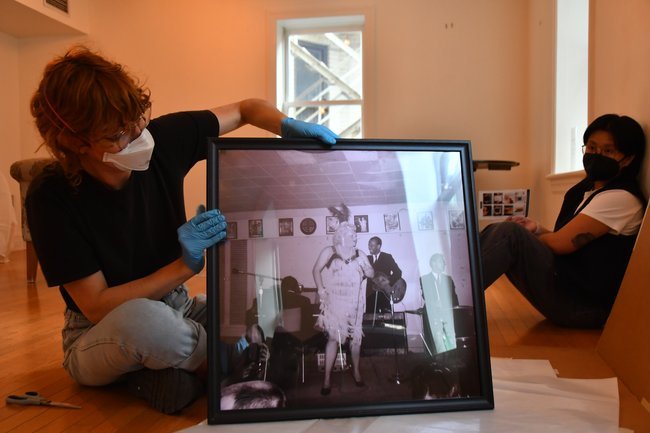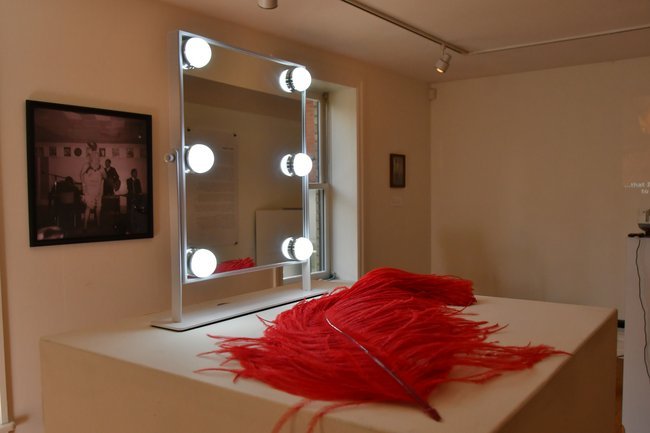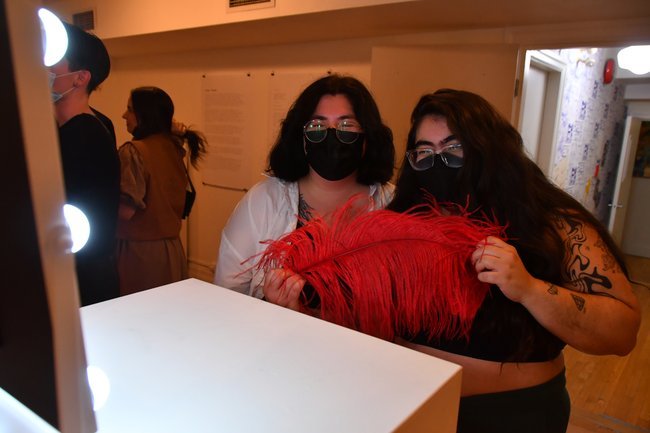"Onstage / Offstage" was displayed September 21 - Oct 14, 2023 in the 2nd Floor gallery space of The ArQuives, Canada's LGBTQ2S+ archives, based in Toronto.
“In September 2023, Toronto-based artist/curator Jordan King present[ed] a multi-media exhibition at The ArQuives gallery, highlighting materials held in our collection.
The exhibition explore[d] the ways stage performance in nightclubs, cabarets, and drag venues offered opportunity for self-actualization for gender fluid, trans, and gender non-binary individuals in the second half of the 20th Century. Documentary media held in the collection of The ArQuives offers a unique lens into the world of queer stage performers – whether portrayed through the eyes of a filmmaker/documentarian or by the performers themselves.”
CURATORIAL TEXT:
Within the last twenty five years the internet created access channels to underground worlds which previously were rarely seen outside of minority enclaves in major urban centres. Simultaneously, increased availability and improvement in digital documentation methods exploded during this time. Archival materials created prior to this major shift, specifically documentation of worlds which were not widely documented, therefore serve as a unique entry point to understanding the lives of past generations of queer and trans individuals.
Throughout the second half of the 20th Century gender diverse performers stepped onstage in nightclubs, bars, cabarets, and drag venues which existed in cities across Canada. These spaces offered temporary reprieve from the outside world in the form of community, along with small-scale celebrity for those who dared step into the spotlight. To perform in drag, or in the case of trans* individuals, as a truer version of self, carried both great risk and offered great reward; applause, attention, joy, and a chance at self-expression.
During the time period in which the media displayed here was created, day-to-day existence for gender diverse individuals was often hostile. In these photographs and rarely seen films, the duality of these performers' lives comes into view. For brief moments, these stage performers experienced moments of adoration. Despite hardship, they developed tight-knit communities and for many, continued their involvement with stage performance in nightclubs and cabarets over decades.
In recent years cultural awareness of the difficulties faced by transgender and gender diverse (gender non-binary, gender fluid) people has increased. When viewing the material displayed herein, consider the risk many of the individuals filmed and photographed took by stepping onstage in the decades these films and documents were created.
The documentation displayed is a small selection of items held within the extensive collection of The ArQuives. Consider therefore the intimate nature granted in viewing these dazzling performances and the opportunity to see performers both onstage as they felt most empowered and offstage in preparation for performance.
A note on language and terminology:
Throughout the exhibition, both filmmakers/documentarians as well as interview subjects themselves use language and terminology which by contemporary standards, may be considered offensive. Viewing historically significant material requires a reminder that language changes and evolves over time, and that terminology in use now may again one day change. As this terminology is in many cases self-applied, understand that this may have been the preference of the individuals based on language in use at the time the films were made.
Special Thanks:
Archive/CounterArchive
Social Sciences Humanities Research Council of Canada
VTape
OCADU
Toronto Image Works
Many Indigenous Nations have longstanding relationships with the land in the area now known as Tkaronto/Toronto. This includes the Anishinabek Nation, the Haudenosaunee Confederacy, the Huron-Wendat, and the current treaty holders, the Mississaugas of the Credit First Nation. This territory is subject of the Dish with One Spoon Wampum Belt Covenant, an agreement to peaceably share and care for the Great Lakes region.
MATERIALS ON VIEW:
Brandy
Personal photographs
Dates unknown (estimated 1950 - 1970)
Anton Wagner fonds
Toronto drag performer Brandy was legendary in Yonge Street bars and nightclubs as far back as the 1950’s. A contemporary of Jackie Shane, Brandy’s act included live vocal renditions of popular jazz and blues songs, backed by a live band. This was standard prior to the widespread availability of recorded music, at which point drag acts tended towards lip-synch performances. Despite experiencing violence and incarceration in late adolescence, along with the difficulties faced by existing in the downtrodden Yonge Street milieu for many decades, Brandy maintained a joie-du-vivre throughout her life. In interviews Brandy self-identified as a female impersonator, in press was referred to as a drag performer, and used he/him pronouns when not in drag.
Journée Internationale de la Transsexualité
Mirha-Soleil Ross (Director)
1998 (38 min, 12 sec)
Mirha-Soleil Ross’s documentary film is an exceptional portrait of an intergenerational community of Trans* women in Montreal. The film offers a backstage look at an annual event celebrating individuals within this community, as well as a rare record of the host venue itself, a nightclub called Cafe Cleopatra which historically served as a hub for Trans* women in Montreal. The nightclub still exists to this day despite rampant gentrification in the surrounding area.
Children of the Drag Ritual
Raphael Bendahan (Photographer)
1973
[Two] black and white photographs are selections from a larger series which documented the backstage lives of performers at The Manatee, an after-hours nightclub located at Yonge St and St Joseph, just a short walk from the location of The ArQuives. During this period performers faced intense harassment from both police and the public, therefore the rarity of these photographs is noteworthy. Bendahan built trust with the performers before beginning this extensive photo essay, trust which is evident in the profound intimacy of these images. Details about the two individuals are unknown.
DIVAS: Love Me Forever (excerpt)
Edimburgo Cabrera (Director) & Anton Wagner (Producer)
2002
This excerpt from Cabrera and Wagner’s feature length documentary is a snapshot into the lives and personal stories of celebrated Toronto-based Black drag performers including Jackae Baker, Chris Edwards, Stephanie Stephens, Matti Dinah, and Michelle Ross, all of whom were active throughout the 1990s. During this period these were stars in the Church Street Village, documented here performing at venues ranging from large circuit parties to small bars.
Included in this portion of the documentary are a glimpse of photographs held in the collection of The ArQuives taken by photographer Raphael Bendahan along with a clip of the short film “Minimum Charge, No Cover”, directed by renowned Toronto filmmakers Holly Dale and Janis Cole in 1978.
Interactive Installation
This installation [was] intended to invite visitors to the exhibition, by offering an interactive, tactile experience. Accompanying text encourage[d] taking a photo, activating the light, and adding the feather to their photo.
Video Interview
Interview with Juan Carlos Mezo González of The LGBTQ Digital Collaboratory about the research process of the exhibition:






